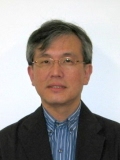Specialization & Areas of Prospective Academic Advisement
Areas of specialization:
linguistic typology, Japanese-Korean contrastive linguistics, cognitive linguistics, grammaticalization and language contact, pragmatics/grammar interface, (cognitive) applied linguistics
You can also refer to the following web site to review my past and current research activities: http://www.gengosf.com/dir_x/modules/wordpress/index.php?p=158
Academic advisement at MA and Ph.D. levels (including the submission of a doctoral dissertation by professional scholars without course work, or “ronbun hakusi”) can be offered in the above areas of specialization. Prospective applicants are encouraged to contact Professor Dr. Kaoru Horie by e-mail (horieling (at) gmail.com).
The following is my short biography:
Kaoru Horie received his Ph.D. in Linguistics from the University of Southern California (USC) in 1993. He is currently a professor in the Department of Applied Linguistics at the Graduate School of Languages and Cultures, Nagoya University, Japan. He was formerly at Tohoku University, where he supervised numerous doctoral dissertations and MA theses. He also served as the director of the 21st Century Center of Excellence Program in Humanities, funded by the Japanese government (2002-2007), that promoted an interdisciplinary approach to the interface between linguistics, cognitive science, and brain science.
Horie combined his interest in cross-linguistic variation in the world’s languages with cognitive-functional linguistic approaches to language structure and use. His research interest centers around: (i) the cross-linguistically variable manifestation of ‘squishy’ phenomena observed with a variety of complex clause constructions, e.g. complement clauses, relative clauses, adverbial clauses, and (ii) grammaticalization and language contact phenomena, and (iii) cross-linguistically differing roles of pragmatic enrichment and inference that compensate code underspecification. The languages he has worked on include (North-) East, South-East, and South Asian, and European languages, with a specific focus on Japanese-Korean morpho-syntactic and semantic/pragmatic contrasts.
Recently, Horie has been working on a framework of Cognitive Typology, a programmatic analytical framework that aims at correlating cross-linguistic structural variation with socio-culturally motivated language use by utilizing insights of Radical Construction Grammar (W. Croft) and the typology of “Do”-language vs. “Become”-language (Y. Ikegami).
His edited/authored works include Complementation: Cognitive and Functional Perspectives (Benjamins, 2000), Cognitive-Functional Linguistics in an East Asian Context (Kurosio publishers, 2001), Recent Trends in Contrastive Linguistics (Hituzi publishers, 2004, in Japanese), The Science of Language, Brain, and Cognition, and Foreign Language Learning (Hituzi publishers, 2009, in Japanese), and A Typology of Languages: Cognitive Typology (Kenkyusha publishers, 2009, in Japanese, with Prashant Pardeshi).
Horie is a founding board member of the Japanese Cognitive Linguistic Association, an ICLA associate organization that hosts 700 members. He also serves as a managing editor of Studies in Language Sciences (SLS), the journal of the Japanese Society for Language Sciences, and as a liaison officer (Japan-Pacific) of the International Circle of Korean Linguistics. He has published many articles dealing with a broad range of issues in cognitive linguistics and linguistic typology.
